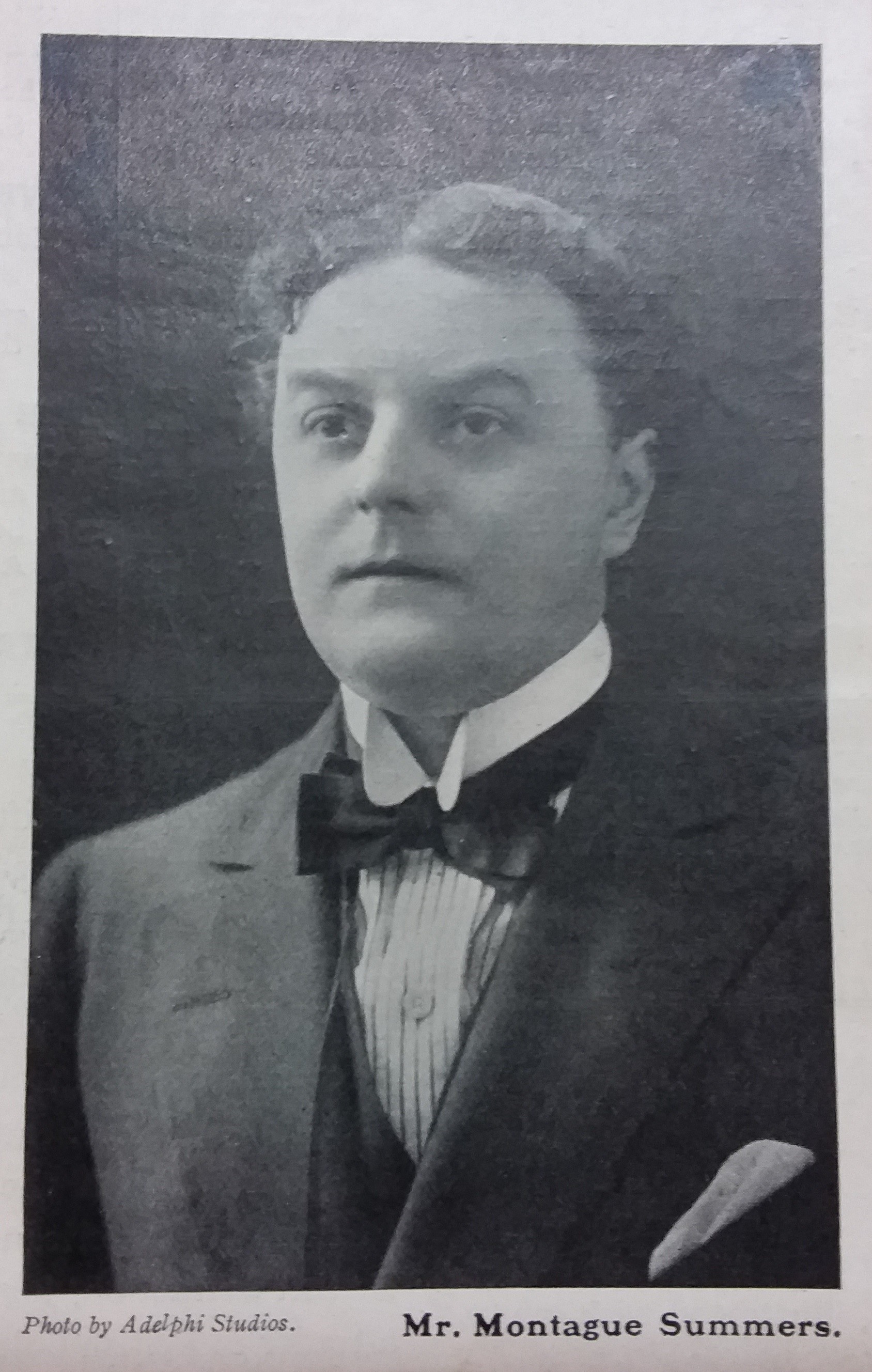

Queer Places:
Clifton College, 32 College Rd, Bristol, City of Bristol BS8 3JH
University of Oxford, Oxford, Oxfordshire OX1 3PA
Richmond Cemetery, Grove Rd, Richmond TW10, UK
 Augustus
Montague Summers (10 April 1880 – 10 August 1948) was an English author and
clergyman. He is known primarily for his scholarly work on the English drama
of the 17th century, as well as for his idiosyncratic studies on witches,
vampires, and werewolves, in all of which he professed to believe. He was
responsible for the first English translation, published in 1928, of the
notorious 15th-century witch hunter's manual, the Malleus Maleficarum.
Augustus
Montague Summers (10 April 1880 – 10 August 1948) was an English author and
clergyman. He is known primarily for his scholarly work on the English drama
of the 17th century, as well as for his idiosyncratic studies on witches,
vampires, and werewolves, in all of which he professed to believe. He was
responsible for the first English translation, published in 1928, of the
notorious 15th-century witch hunter's manual, the Malleus Maleficarum.
Montague Summers was the youngest of the seven children of Augustus William Summers, a rich banker and justice of the peace in Clifton, Bristol. Summers was educated at Clifton College before studying theology at Trinity College, Oxford with the intention of becoming a priest in the Church of England. In 1905 he received a fourth-class Bachelor of Arts degree. He then continued his religious training at Lichfield Theological College.
Summers was ordained as deacon in 1908 and worked as a curate in Bath and Bitton, in Greater Bristol. He never proceeded to higher orders, however, probably because of rumours of his interest in Satanism and accusations of sexual impropriety with young boys, for which he was tried and acquitted.[1] Summers' first book, Antinous and Other Poems was published in 1907.
Summers also joined the growing ranks of English men of letters interested in medievalism, Catholicism, and the occult. In 1909 he converted to Catholicism and shortly thereafter he began passing himself off as a Catholic priest and styling himself the "Reverend Alphonsus Joseph-Mary Augustus Montague Summers", even though he was never a member of any Catholic order or diocese. Whether he was ever actually ordained as a priest is a matter of dispute.[1]
Summers worked for several years as an English and Latin teacher at various schools, including Brockley County School in south-east London, before adopting writing as his full-time employment. He was interested in the theatre of the seventeenth century, particularly that of the English Restoration, and edited the plays of Aphra Behn, John Dryden, William Congreve, among others. He was one of the founder members of The Phoenix, a society that performed those neglected works, and was elected a fellow of the Royal Society of Literature in 1916.
Montague Summers also produced important studies of the Gothic fiction genre and edited three collections of Gothic horror short stories, as well as an incomplete edition of two of the seven obscure Gothic novels, known as the Northanger Horrid Novels, mentioned by Jane Austen in her Gothic parody Northanger Abbey. He was instrumental in rediscovering those lost works, which some had supposed were an invention of Jane Austen herself. He also published biographies of writers Jane Austen and Ann Radcliffe.
Summers compiled three anthologies of supernatural stories, The Supernatural Omnibus, The Grimoire and other Supernatural Stories, and Victorian Ghost Stories. Summers has been described as "the major anthologist of supernatural and Gothic fiction" in the 1930s.[2]
Summers' career as an ostensibly Catholic clergyman was highly unusual. He wrote works of hagiography on Saint Catherine of Siena and Saint Anthony Maria Zaccaria, but his primary religious interest was in the subject of the occult. While Aleister Crowley, with whom he was acquainted, adopted the persona of a modern-day witch, Summers played the part of the learned Catholic witch-hunter.
In 1928, he published the first English translation of Heinrich Kramer's and James Sprenger's Malleus Maleficarum ("The Hammer of Witches"), a 15th-century Latin text on the hunting of witches. In his introduction, Summers insists that the reality of witchcraft is an essential part of Catholic doctrine, and declares the Malleus to be an admirable and correct account of witchcraft and of the methods necessary to combat it. This should be contrasted with the vastly more sceptical and critical attitude of mainstream Catholic scholars, reflected for instance in the Rev. Herbert Thurston's article on "Witchcraft" for the Catholic Encyclopaedia of 1912, which labels the publication of the Malleus a "disastrous episode."[3]
Montague Summers then turned to vampires, producing The Vampire: His Kith and Kin (1928) and The Vampire in Europe (1929), and later to werewolves with The Werewolf (1933). Summers' work on the occult is notorious for his unusual and old-fashioned writing style, his display of erudition, and his purported belief in the reality of the subjects he treats.
Summers cultivated his reputation for eccentricity. The Times wrote he was "in every way a 'character' and in some sort a throwback to the Middle Ages."
Despite his conservative religiosity, Summers was an active member of the British Society for the Study of Sex Psychology, to which he contributed an essay on the Marquis de Sade.[4]
Montague Summers died at his home in Richmond, Surrey in August 1948. An autobiography The Galanty Show was published posthumously in 1980, though much is left unrevealed about his life. His grave in Richmond Cemetery was unmarked until the late 1980s, when Sandy Robertson and Edwin Pouncey organised the Summers Project to garner donations for a gravestone. It bears his favoured phrase "tell me strange things". Summers's manservant Hector Stuart-Forbes is buried in the same plot.[5]
My published books: